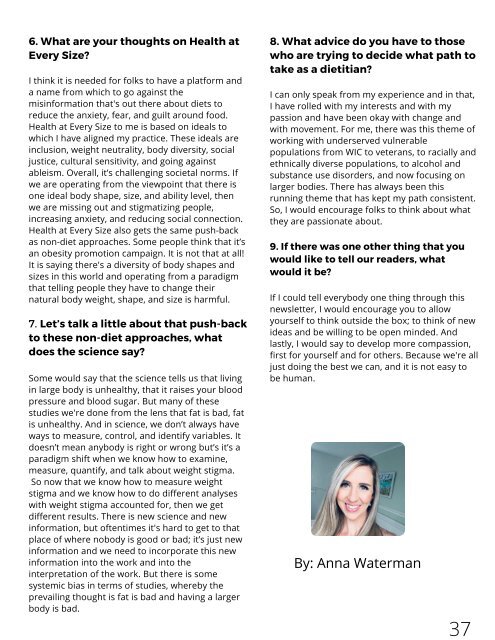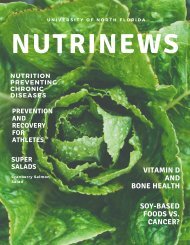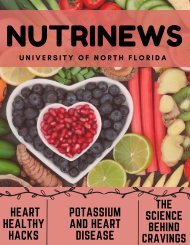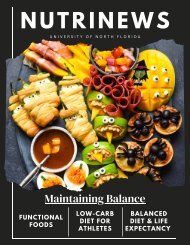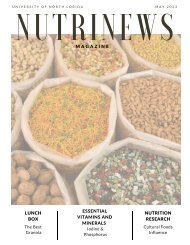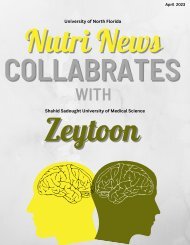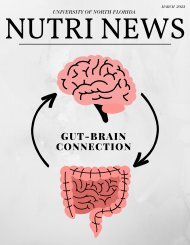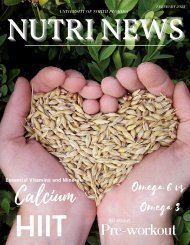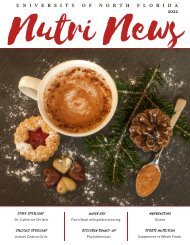You also want an ePaper? Increase the reach of your titles
YUMPU automatically turns print PDFs into web optimized ePapers that Google loves.
6. What are your thoughts on Health at<br />
Every Size?<br />
I think it is needed for folks to have a platform and<br />
a name from which to go against the<br />
misinformation that's out there about diets to<br />
reduce the anxiety, fear, and guilt around food.<br />
Health at Every Size to me is based on ideals to<br />
which I have aligned my practice. These ideals are<br />
inclusion, weight neutrality, body diversity, social<br />
justice, cultural sensitivity, and going against<br />
ableism. Overall, it’s challenging societal norms. If<br />
we are operating from the viewpoint that there is<br />
one ideal body shape, size, and ability level, then<br />
we are missing out and stigmatizing people,<br />
increasing anxiety, and reducing social connection.<br />
Health at Every Size also gets the same push-back<br />
as non-diet approaches. Some people think that it’s<br />
an obesity promotion campaign. It is not that at all!<br />
It is saying there's a diversity of body shapes and<br />
sizes in this world and operating from a paradigm<br />
that telling people they have to change their<br />
natural body weight, shape, and size is harmful.<br />
7. Let’s talk a little about that push-back<br />
to these non-diet approaches, what<br />
does the science say?<br />
Some would say that the science tells us that living<br />
in large body is unhealthy, that it raises your blood<br />
pressure and blood sugar. But many of these<br />
studies we're done from the lens that fat is bad, fat<br />
is unhealthy. And in science, we don’t always have<br />
ways to measure, control, and identify variables. It<br />
doesn’t mean anybody is right or wrong but’s it’s a<br />
paradigm shift when we know how to examine,<br />
measure, quantify, and talk about weight stigma.<br />
So now that we know how to measure weight<br />
stigma and we know how to do different analyses<br />
with weight stigma accounted for, then we get<br />
different results. There is new science and new<br />
information, but oftentimes it's hard to get to that<br />
place of where nobody is good or bad; it’s just new<br />
information and we need to incorporate this new<br />
information into the work and into the<br />
interpretation of the work. But there is some<br />
systemic bias in terms of studies, whereby the<br />
prevailing thought is fat is bad and having a larger<br />
body is bad.<br />
8. What advice do you have to those<br />
who are trying to decide what path to<br />
take as a dietitian?<br />
I can only speak from my experience and in that,<br />
I have rolled with my interests and with my<br />
passion and have been okay with change and<br />
with movement. For me, there was this theme of<br />
working with underserved vulnerable<br />
populations from WIC to veterans, to racially and<br />
ethnically diverse populations, to alcohol and<br />
substance use disorders, and now focusing on<br />
larger bodies. There has always been this<br />
running theme that has kept my path consistent.<br />
So, I would encourage folks to think about what<br />
they are passionate about.<br />
9. If there was one other thing that you<br />
would like to tell our readers, what<br />
would it be?<br />
If I could tell everybody one thing through this<br />
newsletter, I would encourage you to allow<br />
yourself to think outside the box; to think of new<br />
ideas and be willing to be open minded. And<br />
lastly, I would say to develop more compassion,<br />
first for yourself and for others. Because we're all<br />
just doing the best we can, and it is not easy to<br />
be human.<br />
By: Anna Waterman<br />
37


